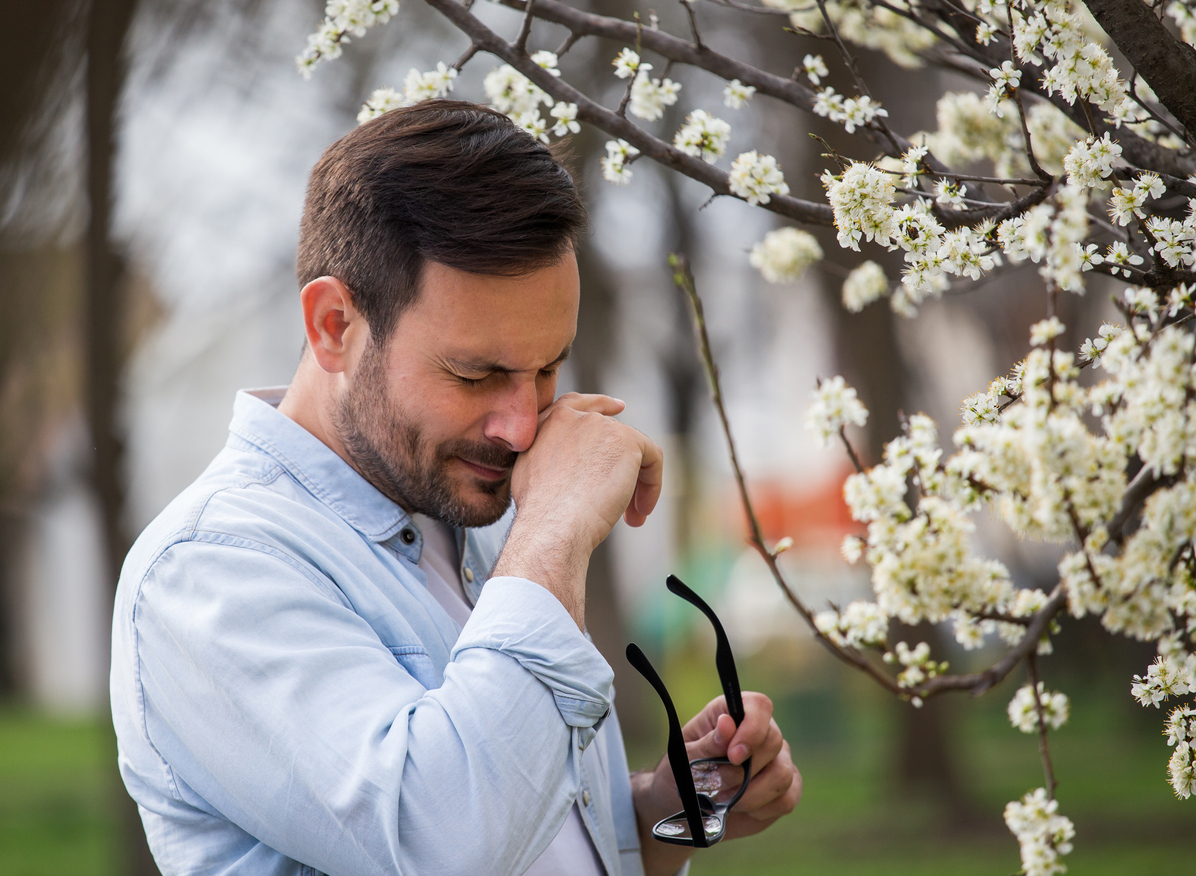An allergy or allergic reaction is your immune system reacting to a foreign substance that is usually not harmful nor would trigger the same kind of reaction in other people.
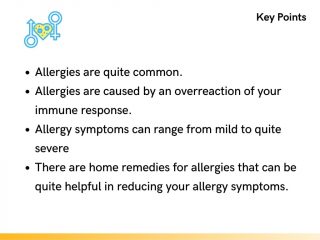
Allergies are quite common. The allergy that you are probably most aware of is reactions to pollen, often referred to as hay fever or “seasonal allergies.” Other allergies that are quite common are allergic reactions to dust, mold, and pet dander. Not all allergic reactions are caused by something in the air you breathe in; there are also food allergies, allergies to medications, reactions to chemicals, and insect bites.
Allergies can be treated quite effectively with OTC and prescription medications. There are also lifestyle changes that can help you better manage your allergies and “home remedies” that may help you with your symptoms. On these pages, we will focus on natural ways and home remedies for allergies.
What Causes Allergies?
To understand what causes allergies, you need to know how your immune system works. Basically, your immune system releases antibodies in response to foreign invaders like germs, viruses, and other microscopic pathogens. On occasion, your immune system “makes a mistake” and releases those antibodies in reaction to the presence of something that isn’t really harmful, like pollen or pet dander. Then, that reaction is “imprinted” upon your immune system, and the next time you come into contact with that “allergen,” it triggers an “allergic” reaction that can inflame or irritate your skin, sinuses, airways, or digestive system.
Unraveling the Allergic Triggers
As described above, your immune system creates an allergic reaction in response to “triggers.” When exposed to a trigger or allergen, your immune system releases chemicals known as histamines, and it is these chemicals that cause the sneezing, swelling, or rash typical of an allergic reaction.
Most triggers cause a minor reaction, such as sneezing, runny nose, or skin rash, but some allergies, like bee stings or food allergies, can trigger a very serious reaction called anaphylaxis. During an anaphylactic allergic reaction, airways narrow, and it could be difficult to breathe, which could be life-threatening if immediate action is not taken. There are no home remedies or natural treatments for a severe allergic reaction causing anaphylaxis; it needs to be treated right away with an injection of epinephrine.
Common Allergens to Be Aware Of

There are a multitude of things that people can be allergic to; in fact, almost anything can cause an allergic reaction in someone. However, the most common allergens are:
- Pollen
- Peanuts
- Tree nuts
- Pet Dander
- Shellfish
- Bee stings
Types of Allergies
Allergies fall into four basic categories: Allergic rhinitis, or hay fever, triggered by pollen, mold, dust, etc; food allergies, triggered by specific foods like a peanut allergy, insect bites, bees, wasps, etc; atopic or skin reactions, and medication allergies.
Categorizing Allergies for Clarity
Let’s take a closer look at the different categories of allergies and their respective symptoms.
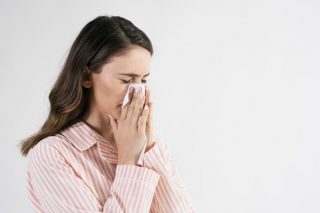
Allergic rhinitis can cause:
- Sneezing
- Itching of the nose, eyes, or roof of the mouth
- Runny, stuffy nose
- Watery, red or swollen eyes (conjunctivitis)

A food allergy can cause:
- Tingling in the mouth
- Swelling of the lips, tongue, face or throat
- Hives
- Anaphylaxis
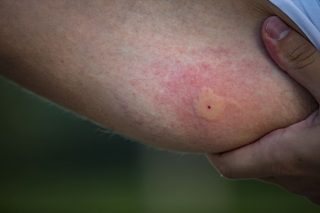
An insect sting allergy can cause:
- A large area of swelling (edema) at the sting site
- Itching or hives all over the body
- Cough, chest tightness, wheezing, or shortness of breath
- Anaphylaxis
A drug allergy can cause:
- Hives
- Itchy skin
- Rash
- Facial swelling
- Wheezing
- Anaphylaxis
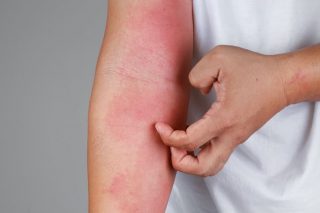
Atopic dermatitis can cause:
- Itch
- Redden
- Flake or peel
Environmental Allergies vs. Food Allergies
An environmental allergy is when your immune system overreacts to allergens in the environment, like something that comes into contact with your skin or something you breathe in. A food allergy is when your immune system reacts to the proteins or other substances in specific foods. As you can see from the list above, food allergies can cause much more severe reactions than environmental allergies. However, both can be managed by learning how to avoid your triggers, making some lifestyle changes, and other home remedies for allergies.
Environmental allergies can be “seasonal,” meaning they can be worse or non-existent during certain times of the year, while food allergies, of course, can happen anytime you come in contact with your triggering food.
Allergy Symptoms
Generally speaking, the symptoms of allergic reactions are based on your triggers and where those triggers come into contact with your body. For example, most “airborne” allergies, such as hay fever, will cause nasal reactions and symptoms like runny nose and sneezing, whereas food allergies will cause reactions like tingling or swelling in the tongue or mouth or gastrointestinal distress.
Recognizing the Signs of Allergic Reactions
It is important to recognize the symptoms of allergic reactions. Allergic reactions can range from mild to severe.
Common Allergy Symptoms to Watch Out For
Again, allergy symptoms are more or less localized to where you come in contact with your trigger:
- Airborne allergens that you breathe in will cause a stuffy or runny nose, coughing, sneezing, wheezing, and an itchy throat.
- Allergens that touch the eyes can cause itchy, watery, red, swollen eyes.
- Food allergies can cause a reaction to the lip, mouth, and throat or gastrointestinal symptoms like nausea, vomiting, abdominal pain, or diarrhea.
- Allergens that touch the skin can cause rashes, hives, itching, blisters, blotches, or skin peeling and flaking.
- Drug allergies can be systemic and cause anything from skin reactions to severe reactions like anaphylaxis.
Home Remedies for Allergies
There is a wide range of home remedies to help you deal with all sorts of allergies, from seasonal or environmental allergies to food allergies. Home remedies for allergies encompass natural solutions, knowing how to avoid your triggers, lifestyle changes, nutritional supplements, and more.
Exploring Natural Solutions
Natural solutions for allergies can be used by themselves or in conjunction with more traditional over-the-counter or prescription remedies. Natural solutions can be quite effective for allergy sufferers and, in many cases, preferable, because if you have allergies, you may already be inclined to sensitivities to conventional treatment like medications, creams, or other topical solutions.
Efficacy of Home Remedies
As with traditional medical treatments for allergies, the effectiveness of any home treatment will depend on the category of allergy you are trying to treat. For example, honey is one of nature’s most powerful relief agents for seasonal allergies. Why? Because it is made from bee pollen, and bee pollen is the most common trigger for seasonal allergies. Raw honey, and especially local raw honey, can desensitize your body to pollen.

Other effective natural or home remedies for allergies include:
- Nasal Irrigation – A nasal rinse cleans mucus from your nose, easing congestion and the itchy, runny nose typical of allergic rhinitis. A 2012 meta-analysis, or “study of studies,” concluded that nasal irrigation with saline was quite effective in relieving the symptoms of hay fever and seasonal allergies.
- Acupuncture – Several studies have found that acupuncture can be effective in treating both allergies. It is believed that the ancient Chinese Medicine technique can interfer with the pathways that cause allergic reactions.
- Butterbur – The herb butterbur is used for many medicinal purposes, there is some evidence that it could be useful in treating allergic rhinitis and other allergies.
- Bromelain – Bromelain is an enzyme found in pineapple. It is a natural anti-inflammatory that has been used in naturopathic medicine to treat joint pain and arthritis for decades. It is believed that those same anti-inflammatory properties of bromelain can be used to naturally treat allergy symptoms by reducing swelling.
- Stinging nettle – Stinging nettle is an herb that is used in complementary and alternative medicine as a natural antihistamine.
- Quercetin – Quercetin is a powerful antioxidant that is found in many foods. Like Stinging nettle, it is used as a natural antihistamine, and naturopathic practitioners say it is effective in treating both nasal and skin allergies.
- Probiotics – Probiotics improve gut health, and a healthy gut could minimize reactions to food allergies.
- Better home air filtration – Improving your inside air quality with air-conditioning and HEPA filters can be a big help in combating pollen, mold dust, and pet dander allergies.
Tips for Managing Allergic Reactions and Reducing the Effects of Allergies

The most effective tip for managing your allergies and reducing allergic reactions is to learn your triggers and know how to avoid them. Other than that, you can make a concentrated effort to reduce exposure to allergens in your home. In addition to proper ventilation as mentioned above, you can reduce dust mites, pet dander, and the presence of mold in your home by using hypoallergenic covers for mattresses and pillows, regularly washing bedding in hot water, and using a dehumidifier to keep humidity levels low and prevent mold growth.
Here are a few more tips:
- Wash and shower regularly – Wash up every time you come from the outside; your skin can easily pick up pollens and other allergens from being outdoors. Also, take a tip from the Japanese and leave your shoes outside.
- Wear a mask – We all got used to wearing masks to minimize the spread of COVID during the pandemic; a good N95 mask can do the same to minimize your exposure to allergens.
- Stay hydrated – Try to drink about eight to ten glasses of water every day. Staying hydrated loosens up mucus and helps reduce inflammation of the nasal passages.
- Swap out carpets for wood or vinyl floors – Carpets are ground zero for dust, pet dander, and other allergens. Foot traffic drives these particles deep into the carpet, where they cannot be vacuumed out. If you know you have respiratory allergies, rip up the carpet and replace it with vinyl or wood floors.
Lifestyle Changes for Better Allergy Control
In addition to the home remedies and tips mentioned above, there are some long-term lifestyle changes you can make for better control of your allergies and allergy symptoms.
- Exercise – Regular exercise is good for so many aspects of your overall health, and it seems to also specifically help with controlling allergy symptoms. Doctors and researchers are not sure exactly why exercise helps with allergies; they just know that it does. If you have seasonal allergies, avoid running or exercising outdoors; exercise indoors in a clean, well-air-conditioned room.
- Eat a healthy diet – Like exercise, eating a healthy diet seems to minimize the chances of developing allergies. Also, like exercise, the link is not entirely clear, but research indicates that children who eat lots of fresh fruits and vegetables have fewer allergy symptoms.
- Do not smoke or do not allow people to smoke in your home – There are many reasons to avoid contact with cigarette smoke, not the least of which is that it is a known allergen.
- Go chemical-free – Use natural or “chemical-free” cleaning products, detergents, and personal hygiene products.
Conclusion
Allergies may not be able to be cured, but you can learn to live with them and, in many cases, control them without shots or other medical interventions by making some important lifestyle changes and using the effective home remedies discussed on these pages.

